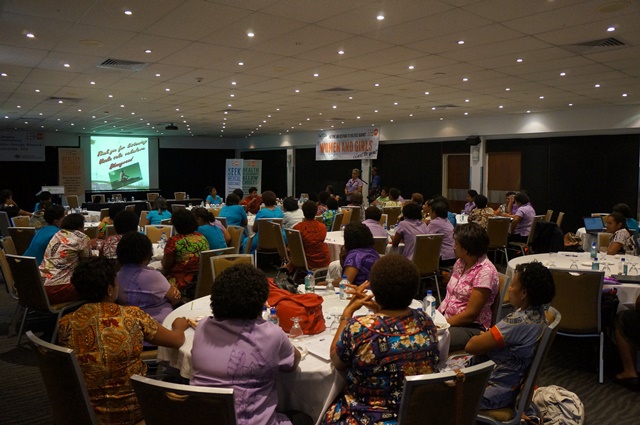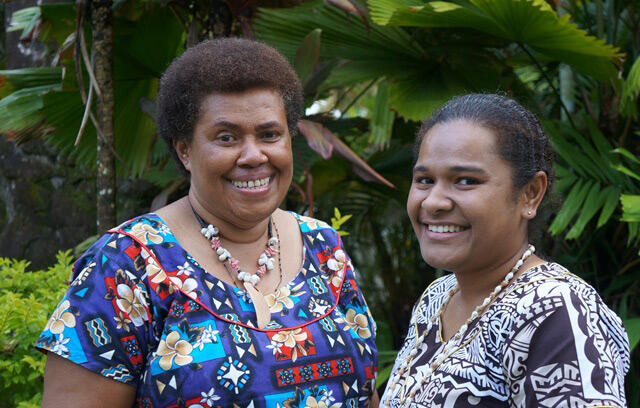SHE has had to birth infants with a torch locked into position by her teeth when there is no power in the island health facility she works in as a midwife, but her eyes reflect joy at the memories she describes and her passion for midwifery is undeniable.
Some nights Litiana Tatukivei has had to cross miles of open sea in complete darkness with nothing but faith to cling to, as she ferried women experiencing complications during labour to the closest referral hospital in a simple outboard motor.
Met by an ambulance on the other side, it will be another three to four hours before she reaches Labasa Hospital on Vanua Levu - the recently improved roads has cut this portion of the trip down from six to seven hours.
It's all part of the job, 30-year-old says with a smile; she cements any doubt of her passion for her job when she reveals that she'd voluntarily left a position in Suva's Colonial War Memorial Hospital maternity ward for the Taveuni hospital.
To be in emergency nursing was an initial goal but one would have to work for years before even dreaming of that role; posted in CWM's maternity ward however affirmed her vocation for her. Nothing compared to the joy of presenting children to their mothers.
"There are also cases you come across of couples who have been trying for a long time to have children, to be part of the joy that comes with this long-awaited baby is what makes my day, the satisfaction that comes with this job is immense," Tatukivei said during a break from the Fiji Midwifery Society conference last Saturday.
Tatukivei has absolutely no regrets of pursuing a midwifery course in 2010, only four years after graduating as a nurse, no easy feat for a country where one needs to have worked more than five years to be accepted. She attributes her early move into midwifery to her exposure to a lot more experience and real-life situation decision-making processes that she may not have experienced in bigger hospitals. In 2011, she completed the Advanced Life Support in Obstetrics.
"Midwives are essential in all hospitals, in all health care facilities - we do it for the women in our villages, towns and provinces - we have to ensure that they enjoy their birthing experience, that they know what their body is going through, that there is genuine empathy and care for them," she said.
There are socio-cultural barriers which she says is addressed with honest discussions with family members and she understands young mothers who refuse to go to the Labasa Hospital, the main divisional referral hospital in the Northern Division, because of the preference to be close to home as possible.
She shrugs off the common occurrence of couples asking for a more senior nurse. "It is understandable they will prefer experience so it really is a case of assurance that it is what I am specialised in, I have been trained to do this," she says quietly.
"I've learned that if you want things to work out well for everyone, you have to convince family members with as much information as possible, and offer as much assurance as we can provide."
In Taveuni like most health facilities around the country, midwives and nurses are responsible for all births with remote supervision if and when needed and advisory support from gynaecology and obstetrics consultants usually based at the nearest divisional hospital.
In Fiji, nurses and midwives make up 62 per cent of the total health workers under the Ministry of Health. Nurses are now required to be registered. An unregistered nurse can cost her or his employer $10,000.
There are 307 midwives in Fiji and continuous training is essential to make up for attrition rates as the world over experiences a shortage of health workers.
The International Confederation of Midwives (ICM) defines a midwife as "a person who has successfully completed a midwifery education program that is duly recognised in the country where it is located and that is based on the ICM Essential Competencies for Basic Midwifery Practice and the framework of the ICM Global Standards for Midwifery Education".
Fiji Midwifery Society president Matron Aliote Galuvakadua expressed appreciation for the support from the United Nations Population Fund (UNFPA) which allowed health workers like midwives to carry out some essential activities like the Society Scientific Conference last weekend with the theme "Empowering Midwives through Research".
The society was established in 1999. The lowering of the retirement age to 55 in 2008 meant the majority of nurses who made up the midwifery numbers had to retire. It also put an end to the Midwife Birthing Units. Once pregnant women were declared low-risk by doctors, they were completely taken care of by the midwives from pregnancy to post-natal care through this unit.
A former school teacher who experienced the birthing unit services shared her experience to participants at the society conference affirming the benefit of a closer interaction with midwives, which in turn made a vast difference to her whole experience including information on what her body was experiencing, how it was changing, things that she did not knobefore.
Matron Aliote said society members would now prioritise finalising the amendments to the constitution and completing a scope of practice to guide and to an extent protect members. More support for further studies or research opportunities for members will be sought by the society.
"The ultimate goal is that all birthing wards will be manned by qualified midwives. If we trained 50 every year for the next five years, we could have more midwives stationed at more birthing facilities and it would contribute to our national indicators of the MDGs," Matron Aliote said.
Millennium Development Goal 5 is about reducing maternal mortality and achieving universal access to reproductive health; capacity-building of health workers are one of the core mandate areas of the UNFPA.
"The UNFPA priority areas include various midwifery activities one of which is supporting scientific conference the Fiji Midwifery Society held last weekend and strengthening the capacities of members so we look forward to working closer with Pacific midwives in the new year," UNFPA Pacific Sub-Regional Office director and representative Dr Laurent Zessler said.



